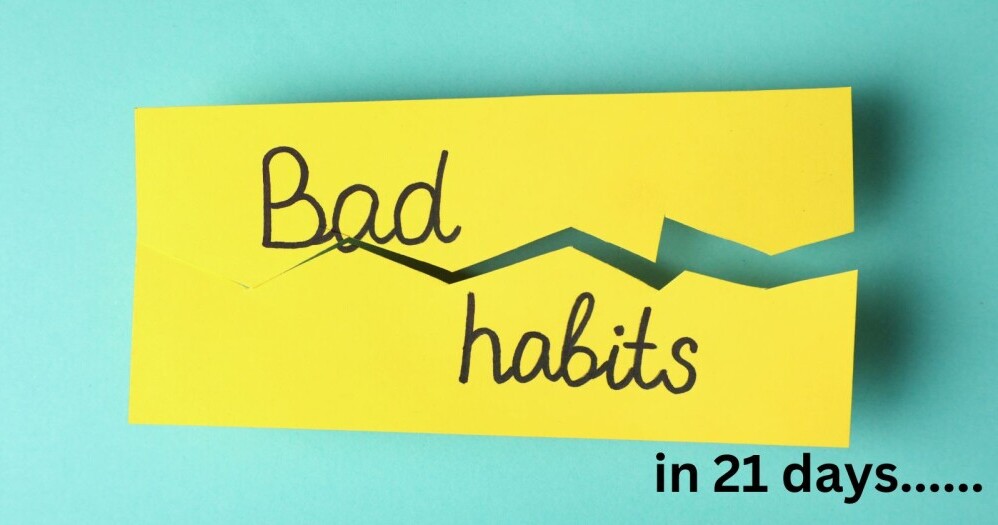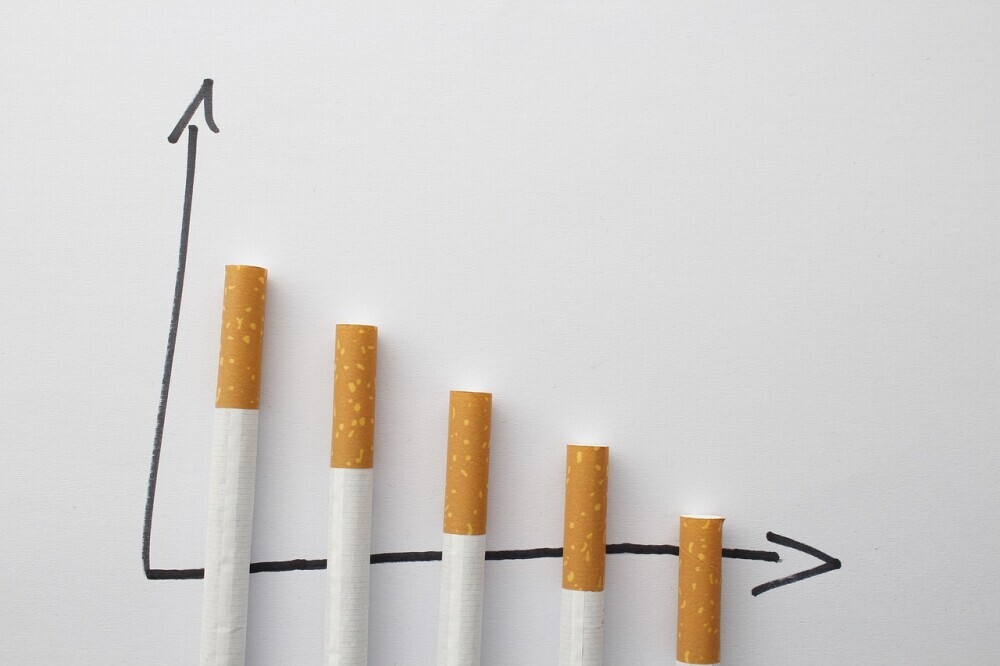Let’s look at how to break bad habits in 21 days. It may take longer, but it is supposed to take 21 days to break a bad habit in most cases.
Here are some tips to help you stay the course.
To break a bad habit in 21 days, focus on identifying your triggers, replacing the bad habit with a positive one, setting realistic goals, practicing mindfulness, managing your environment to minimize temptations, and staying consistent with your new behavior, while acknowledging that setbacks may occur and being patient with the process.
Let’s break it down below.

How To Break Bad Habits
5 Effective Steps To Overcome Negative Patterns
If you are fully aware that something is bad for you, why is it so difficult to stop?
70% of smokers report that they want to quit. People who abuse alcohol or drugs struggle to break free of their control over their lives. Many people carry unhealthy weight that could be lost if they exercised more and ate right. Why do so many people have trouble overcoming these negative patterns?
Scientists funded by the National Institutes of Health (NIH) are searching for the answer to that question. They study what happens in our brains while habits are forming. They have discovered clues to why our bad habits are hard to overcome. They are working on strategies that will help us make the changes we need to make in our lives.
Here are some effective steps on how to break bad habits in 21 days:
Understand that success won’t be a straight line.
As you begin trying to change, you will find setbacks and bumps in the road. They are parts of the important process of developing lasting change. You are your own worst critic, and you may view anything less than complete success as a failure.
It may help to take the perspective of a third person and react as you would to a friend trying to change, instead of yourself. You would be reassuring and kind, rather than critical. Allow yourself the same treatment.
Make an achievable game plan.
Start your journey with a game plan you can achieve. Just thinking about change isn’t normally enough to overcome negative patterns. Instead, use a journal – or your phone, or paper – and start with a plan.
Gain some introspection into the changes you want to make. Consider:
- What is your main goal?
- Why is that goal one you want to achieve?
- Can you set smaller goals to help you reach the main goal?
- What things trigger your bad habit?
- What setbacks do you foresee?
- What types of coping strategies can help you deal with your triggers and your setbacks?
- What type of support system is available for you?
- How will you be tracking challenges and progress?
Keep changes simple.
The reason it’s difficult to break your bad habits is that they are already automatic and easy. New behaviors are harder to adopt. Your brain has not yet taken them on. When you make your new goal behaviors simple, it helps in integrating them into your brain’s autopilot routines.
Practice mindfulness.

Mindfulness will assist you to develop an awareness of your thoughts, your feelings, and your actions. Simply observe the impulses related to your bad habits without reacting to them or judging them.
As you develop awareness of your routine behaviors and the triggers that cause them, you can consider other available options, like not acting on your urges or avoiding cues that cause you to remember bad habits.
Practicing consistent mindfulness will also help you in noticing ways in which your habits affect your life daily. As you begin recognizing those effects, it helps you to feel driven to change the bad habits.
Cut out your triggers.
Cut as many triggers as you can from your life. If you usually smoke when drinking, don’t drink alcohol. If you eat whatever cookies you have in your house, throw them away. Make it easier to break your bad habits by avoiding whatever causes them.
Once you have broken a bad habit, what’s the next step? You need to plan to prevent any relapse. Bad habits are difficult to break, and it will usually take multiple attempts to change. Remember to be compassionate with yourself, so you won’t give up when you encounter a setback or roadblock. That makes success much more probable.
And remember, it takes 21 days of consistency to change or break a habit.
References:
https://www.healthline.com/health/how-to-break-a-habit#be-mindful
https://www.health.harvard.edu/blog/how-to-break-a-bad-habit-202205022736
https://health.clevelandclinic.org/how-to-break-bad-habits
![]()

Anyone wanting to break a bad habit, will find this guide very helpful. I fully agree that it is important to identify what triggers the habit, and then avoid it. I used that when giving up smoking, and didn’t drink any coffee or wine for months, as it was automatic for me to light up when having coffee or wine.
Calculating what I was burning on cigarettes, and then saving that amount every month, was a great incentive not to start again. And remember, don’t beat yourself up if you slip up occasionally, but perseverance will pay off.
You are so right Line. Too many people give up with they fail once, instead of picking themselves up and trying again. Everyone slips occasionally.
I really appreciate how you explain why bad habits can be so hard to change but give the optimistic perspective that breaking them in 21 days is achievable. It’s inspiring and makes me want to try! I found the mindfulness tip particularly helpful—becoming aware of triggers and understanding the real reasons behind bad habits is such a powerful approach. I also love the emphasis on having a big goal while staying mindful of the ‘why’ behind it. Setting realistic, smaller goals as stepping stones and celebrating those little successes is a fantastic strategy to stay motivated and overcome setbacks. This post has given me a lot of encouragement to take the first step—thank you!
Thank you for stopping by Bayara and glad this article was enjoyable and helpful for you.
Wow! This article really provides easy steps to be able to break a habit. Granted it will take practice and discipline, but you give great steps that are literally baby steps. I truly believe like you said that breaking bad habits is important because these habits can hold us back from reaching our full potential and negatively impact various aspects of our lives, like our physical health, mental well-being, relationships, and even professional success. Bad habits often become ingrained in our daily routines, which can make us feel stuck or like we’re not progressing. By breaking them, we open up the opportunity for growth, healthier behaviors, and a more balanced, fulfilling life. Thank you for providing these important steps for freedom!
Bad habits certainly do hold us back in some way Charles, and it is important to replace those with habits that are more productive and of benefit to you. It isn’t easy, especially if you have been doing the same thing for years.
Breaking bad habits is indeed a challenging endeavor, and the 21-day framework offers a structured approach to initiate change. It’s intriguing to consider the role of “habit loops” in this process.
As highlighted in Charles Duhigg’s “The Power of Habit,” a habit loop consists of a cue, routine, and reward. By identifying and modifying these components, one can effectively reshape behaviors.
For instance, if late-night snacking is a concern, recognizing the trigger (perhaps boredom or stress) and substituting the routine with a healthier activity, like reading or a brief walk, can be beneficial. Additionally, the concept of “habit stacking,” where new habits are linked to established ones, can reinforce positive changes.
Pairing a desired new behavior with an existing routine creates a mental association that makes the new habit more likely to stick. It’s also worth noting that while the 21-day period is a popular guideline, research suggests that the time required to form or break a habit can vary among individuals. Therefore, patience and persistence are key.
Has anyone found success with specific techniques or strategies in altering their habits? Sharing personal experiences could provide valuable insights for others on this journey.
It would be interesting to find out if anyone else has any other techniques to add, as I am sure there are many ways, and not everything will work for everyone.